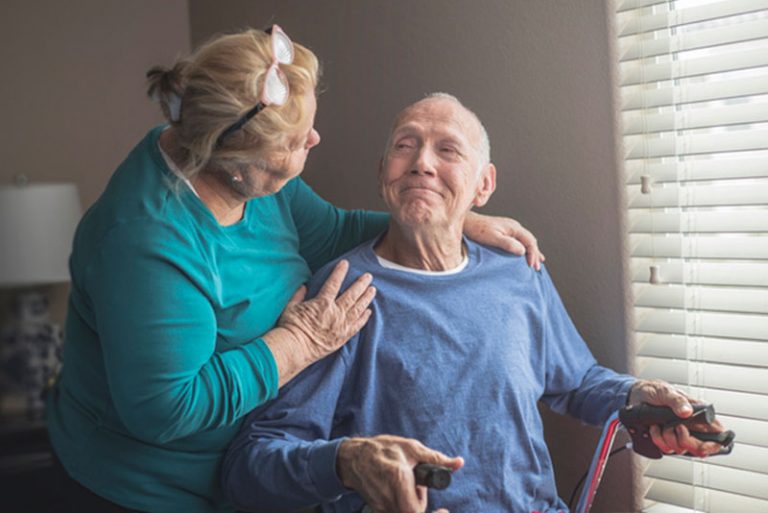Life is precious. We never feel as though we have enough time with loved ones, especially when illness is involved. Following a terminal illness diagnosis, family and friends are often consumed with their own feelings of confusion, fear, and grief, and may be at a loss for how to show support. However, support and understanding are what the person with the illness needs most.
If an individual in your life has been diagnosed with a terminal illness, the following tips can help you provide the support they need.
- Live as close to a normal life as possible. When a loved one has a terminal illness, life can seemingly change overnight. The important thing to remember is to spend the time you have with the person wisely. Continue doing things together, such as going out to dinner, participating in activities he or she enjoys, and seeing other family members and friends when the person is able. Even simple moments, like a cup of coffee and conversation on the front porch can mean a lot and will help make life feel more normal for everyone.
- Ask permission before telling others about the diagnosis. Sharing our worries with others often helps us lighten our emotional loads. When it comes to someone else’s diagnosis, though, you should never share information before asking permission. Some individuals are private and may not want many people to know about their diagnosis. Others may feel more comfortable talking openly about their illness. Discuss with your friend or loved one how to handle sharing the diagnosis with others and respect his or her wishes.
- Ask questions. Talking about end-of-life topics with a terminally ill loved one can be incredibly emotional and difficult, but it is also very important. Questions to ask include:
- How does he or she want to spend his or her remaining days?
- What concerns or fears does he or she have about his or her illness and/or death?
These are undoubtedly hard conversations to have, so take it slow. Only discuss what the person is willing or able to discuss in the moment, and assure your loved one that you want to help fulfill his or her wishes as the illness progresses.
- Really listen and avoid offering opinions. Often, a terminally ill individual has exhausted every treatment option with his or her physician before arriving at the final diagnosis, so statements that start with, “Have you tried,” You should see,” or “My friend saw good results with…” are not helpful. Instead, listen to your friend or loved one without thinking about how you can or should respond. Simply let him or her talk, and nod, smile, and make eye contact in response. This will show that you are truly present and want to know how he or she is feeling.
- Provide tangible support as well. When a person is physically ill, coordinating his or her own needs can be daunting. So instead of asking what your friend or loved one needs, take note for yourself. Is the household low on fresh food? If so, go grocery shopping and stock the refrigerator. Is laundry piling up? Do a load while you’re there. Stop by on a regular basis to see if anything needs to be done. This takes a huge burden off of the individual and gives the person more time to rest and enjoy moments with friends and loved ones.
- Laugh often. A terminal illness comes with a heavy emotional weight for everyone involved. This makes laughter all the more important and precious. Watch silly movies together. Reminisce about fun trips or past hijinks. Play games together. These moments will create lasting, happy memories that will provide comfort for both you and your loved one.
- Make time for grief. Grief is a challenging, yet healing emotion that shouldn’t be ignored. Make space for both your loved one and yourself to grieve, cry, be angry, and work through these complex emotions during this time. And remember, everyone grieves differently and at their own pace. Be gentle with yourself and your loved one.
Hospice Can Help
Supporting a loved one with a terminal illness can be emotionally challenging, but ultimately beneficial to both the individual and to your own healing process. At Superior Home Health and Hospice, a leading provider of hospice and home health care in Santa Maria, CA and the surrounding areas, we know how much supportive care means for terminally ill patients and their families, and we are honored to help provide compassionate support that allows families to spend more time on the things that matter most.
Our hospice care services can support individuals and families in a number of ways, including:
- Physical care
- Therapeutic music
- Medication and symptom management
- Bathing and personal care
- Light housekeeping and respite care
- Nutrition guidance
- Emotional and psychological support
- Spiritual counseling
- Bereavement support
- And much more
To learn more about our care team, our services, and how we can help individuals who have been diagnosed with a terminal illness, reach out to our in-home hospice care team today at 805-742-4514. We are happy to answer any questions you have and provide much needed support and respite care for your family.
